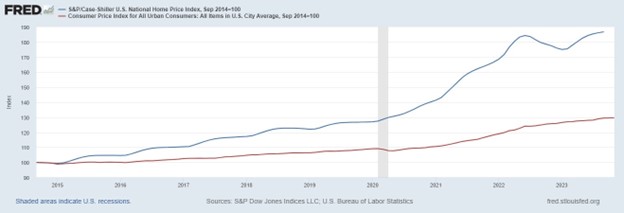It is theoretically bankrupt because price changes for individual goods and services reflect unique market factors in addition to broad-based inflation trends. There is no reason to expect any good’s price changes to always equal the average of all price changes (e.g., measured inflation). For instance, a deep frost that diminishes the orange crop will cause prices for oranges to increase faster than inflation. There reverse occurs when there is a bumper crop of oranges.
Forcing the price of any good to reflect only the current inflation trends eliminates necessary price changes to the detriment of consumers. Perhaps it is due to the importance of a vibrant pharmaceutical market that the Administration’s proposal fails to understand this basic economic concept. But applying this logic to another important market – the housing market – clearly demonstrates the policy’s folly.
Consider the chart below that displays the growth in home prices over the past 10 years (+86.7%) compared to the growth in overall inflation (+29.5%). As the chart illustrates, home prices over the past 10 years have growth nearly three times faster than overall inflation.

Based on the Administration’s logic, anyone who has owned their home for 10 years should be forced to sell their house for 31 percent below market value to equate the increases in home prices to the increases in overall inflation. Since home prices have been consistently growing faster than inflation, families who have owned their homes for longer periods of time would need to offer larger price discounts.
Presumably the Administration would not support this position even though housing affordability is a growing problem. And rightly so. Long-term housing affordability problems are driven by errant policies that constrain housing supply, which have been amplified by the recent surge in mortgage interest rates.
Addressing the housing affordability problem is crucial, but forcing families to sell their homes below market value will not solve the problem. Instead, such a policy will discourage families from selling their homes, which will exacerbate the housing shortage and worsen the affordability problem. Sustainably addressing the housing affordability problem can only be achieved by correcting the policies creating artificial supply shortages.
The same logic applies to the pharmaceutical market. Drug affordability problems are more accurately understood as a patient out-of-pocket crisis driven by the drug market’s complexity and opacity. Just like the housing market, fixing the out-of-pocket crisis requires reforms that fix the underlying policy deficiencies not by piling on more ill-considered policies on the market.
Forcing companies to sell their medicines at arbitrary prices set by the government creates disincentives that will worsen the outcomes for patients. These include reduced incentives to develop innovative medicines jeopardizing potential efficacious treatments for devastating diseases. The price distortions also alter how companies will account for the possibility that future costs will rise faster than inflation. Without the ability to raise prices, these cost increases could adversely impact their ability to cover their expenses.
These consequences may be unintended, but they are certainly predictable. And these costs demonstrate the Administration’s recklessness.
Wayne Winegarden, Ph.D. is a Sr. Fellow in Business and Economics and Director of the Center for Medical Economics and Innovation at the Pacific Research Institute.

